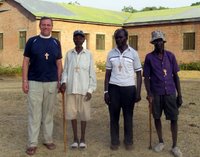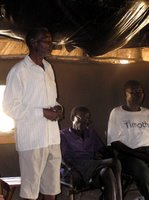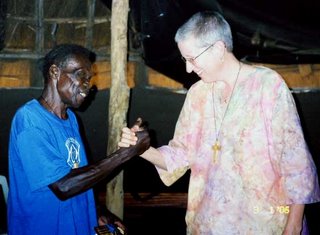Watches
Few people in Lui wear watches. The rhythms are much more natural. You eat an hour or two after waking. You eat again at mid-day, and then again an hour or so after dark. When it’s time for a meeting or for church, somebody begins sounding a drum and folks head to the event. Greeting one another on the pathway is much more important than being “on time.”
Tuesday, June 06, 2006
“Food First”
The other day in Mariba, the Bishop used what is apparently a catch-phrase around here: “Food first” – i.e., it’s foundational to any other development. We must attend to that issue first. Sustainable development requires that we help the Moru people develop food-sufficiency as a foundation for everything else.
But in another way the Bishop is wrong. From what I experienced among the Moru, it’s not really "Food first." For the Moru, it’s people first. Despite their hunger. Despite their thirst. It’s people. Relationship. A warm handshake that is firm and lasts a long time while you begin to talk. I'm astonished at the primacy they give to relationships.
The other day in Mariba, the Bishop used what is apparently a catch-phrase around here: “Food first” – i.e., it’s foundational to any other development. We must attend to that issue first. Sustainable development requires that we help the Moru people develop food-sufficiency as a foundation for everything else.
But in another way the Bishop is wrong. From what I experienced among the Moru, it’s not really "Food first." For the Moru, it’s people first. Despite their hunger. Despite their thirst. It’s people. Relationship. A warm handshake that is firm and lasts a long time while you begin to talk. I'm astonished at the primacy they give to relationships.
Drought . . . and the "Threat" of Rain
The Lui boreholes are going dry. Folks come early in the morning and pump out what water is there. Then they sit and wait 3-4 hours for more water to trickle into the bottom of the borehole from nearby aquifers. A bit of rain would help Lui so much!
But we are also hearing that cholera outbreaks are appearing in Juba, because it’s nearer to the river and rains are coming there. The Samaritan’s Purse Hospital in Lui is preparing for cholera. They will open and operate a separate, quarantined facility to deal with cholera victims if they come this way.
Though we pray for rain to come of Lui, we have learned that would also bring an increase of water-borne diseases like cholera. Sometimes it feels like these folks just can’t catch a break!
The Lui boreholes are going dry. Folks come early in the morning and pump out what water is there. Then they sit and wait 3-4 hours for more water to trickle into the bottom of the borehole from nearby aquifers. A bit of rain would help Lui so much!
But we are also hearing that cholera outbreaks are appearing in Juba, because it’s nearer to the river and rains are coming there. The Samaritan’s Purse Hospital in Lui is preparing for cholera. They will open and operate a separate, quarantined facility to deal with cholera victims if they come this way.
Though we pray for rain to come of Lui, we have learned that would also bring an increase of water-borne diseases like cholera. Sometimes it feels like these folks just can’t catch a break!
Broken Glasses (Thurs., 2 March)
This morning crawling out of bed before daylight, I slipped into my sandals, and was fumbling around for flashlight and eyeglasses. Unfortunately, I heard a dull crunch under my sandal, praying it was just an earring. But, no, it was my glasses. One of the eyepieces now sticks out at a jaunty angle that doesn’t really fit on my head anymore. I can’t really use my glasses now.
But it didn’t get me all bummed out. Instinctively and immediately, I was grateful I didn’t shatter a lens. The glasses are wearable, and I can get the frames fixed when I get home next week.
That’s just another of the many ways in which I’m realizing that I am lucky to be going home. My glasses got broken. But I can get them fixed next week. Unlike the people of Lui – who either don’t have glasses, or have no way to get them fixed.
This morning crawling out of bed before daylight, I slipped into my sandals, and was fumbling around for flashlight and eyeglasses. Unfortunately, I heard a dull crunch under my sandal, praying it was just an earring. But, no, it was my glasses. One of the eyepieces now sticks out at a jaunty angle that doesn’t really fit on my head anymore. I can’t really use my glasses now.
But it didn’t get me all bummed out. Instinctively and immediately, I was grateful I didn’t shatter a lens. The glasses are wearable, and I can get the frames fixed when I get home next week.
That’s just another of the many ways in which I’m realizing that I am lucky to be going home. My glasses got broken. But I can get them fixed next week. Unlike the people of Lui – who either don’t have glasses, or have no way to get them fixed.
Lui to Loki (Thurs., 2 March 2006)
It’s not usual for me to awake early – but I did so on this last day in Lui. I came awake around 5:45 a.m., so I was up and about before anyone else in the compound. It was still very dark, since dawn doesn’t arrive until ca. 7:00 a.m. So I got to enjoy the beautiful, starry night sky one last time. The sky here is awesome! You can see the entire Milky Way stretching from the northern to southern extremes of the sky. The Southern Cross was no longer visible, but we have seen it low in the south sky every night.
I sat out on the grass in my shorts, just enjoying the quiet and having a smoke, for quite a while.
We just do not have that quality of quiet at home. There’s not a single mechanical noise (except for the occasional, rare vehicle) in Lui. And the sounds are natural – roosters, goats, chickens, pots and kettles beginning to clatter as women begin to heat water and cook, the wing rustling the palms.
Gradually, my companions began to awake early on Thursday, in order to be ready for our truck ride to Mundri airstrip. Poor stupid Americans! We had been told we would depart “first thing” Thursday, but some of us forgot we were operating on East Africa time! But Simon eventually showed up with the Land Rover to take us to the airstrip.
I don’t know about the other travelers on our trip, but somehow it had not registered to me that we would be leaving Deborah behind. The parting from our Lui friends happened way too fast! – and especially my too-sudden and too-short hug with Deborah, who would be staying in Lui for about three more months.
Then there were the hugs and leave-takings with our friends in Lui. It all happened too fast! In that moment, it was vividly clear to me that we were heading to the safety of the U.S., and we were leaving friends in Lui, who might or might not survive the drought and hunger that was raging in Lui.
We piled into the truck for the trip to the Mundri airstrip. As usual, the trip was miserable, with all the bouncing and heat of the trip. We arrived at the Mundri airstrip, and my thermometer topped-out at its maximum temperature of 120 degrees.
We took off from Mundri ca. 2p, descending into Loki ca. 3:35p
It’s not usual for me to awake early – but I did so on this last day in Lui. I came awake around 5:45 a.m., so I was up and about before anyone else in the compound. It was still very dark, since dawn doesn’t arrive until ca. 7:00 a.m. So I got to enjoy the beautiful, starry night sky one last time. The sky here is awesome! You can see the entire Milky Way stretching from the northern to southern extremes of the sky. The Southern Cross was no longer visible, but we have seen it low in the south sky every night.
I sat out on the grass in my shorts, just enjoying the quiet and having a smoke, for quite a while.
We just do not have that quality of quiet at home. There’s not a single mechanical noise (except for the occasional, rare vehicle) in Lui. And the sounds are natural – roosters, goats, chickens, pots and kettles beginning to clatter as women begin to heat water and cook, the wing rustling the palms.
Gradually, my companions began to awake early on Thursday, in order to be ready for our truck ride to Mundri airstrip. Poor stupid Americans! We had been told we would depart “first thing” Thursday, but some of us forgot we were operating on East Africa time! But Simon eventually showed up with the Land Rover to take us to the airstrip.
I don’t know about the other travelers on our trip, but somehow it had not registered to me that we would be leaving Deborah behind. The parting from our Lui friends happened way too fast! – and especially my too-sudden and too-short hug with Deborah, who would be staying in Lui for about three more months.
Then there were the hugs and leave-takings with our friends in Lui. It all happened too fast! In that moment, it was vividly clear to me that we were heading to the safety of the U.S., and we were leaving friends in Lui, who might or might not survive the drought and hunger that was raging in Lui.
We piled into the truck for the trip to the Mundri airstrip. As usual, the trip was miserable, with all the bouncing and heat of the trip. We arrived at the Mundri airstrip, and my thermometer topped-out at its maximum temperature of 120 degrees.
We took off from Mundri ca. 2p, descending into Loki ca. 3:35p
Monday, June 05, 2006
Lui Leaders’ Meeting (Wed., 1 March 2006)
I didn't realize we would have a significant “diplomatic event” on our last day in Lui, but we had one. Late in the day – a couple of hours before sunset – we were all summoned into one of the large meeting houses (“payuts”) and found that the leaders of the Lui community had gathered there – priests, deacons, tribal leaders, Mothers’ Union. The Bishop was there, along with the Dean of the Cathedral, as was the local leader of the SPLA.
It’s really not fair to say we had “no” warning. We knew there was going to be some sort of wrap-up. I just did not realize how many of the local leaders were going to be present. And that's why I have no photographs of this event: It felt too important to take pictures.
And I was so absorbed in this meeting that I did not make many journal-notes about it. Everyone in Lui made a statement about what they worried about, what hopes they had experienced in our visit with them, and what they hoped for the future of the relationship between the Diocese of Lui and the Diocese of Missouri.
 Archdeacon Robert, the village mayor, Bishop Bullen, and the Moru tribal chief were among the people who participated in the meeting.
Archdeacon Robert, the village mayor, Bishop Bullen, and the Moru tribal chief were among the people who participated in the meeting.
I was overwhelmed by the strength of their statements. Clearly, they hoped and/or believed that our presence there was a promise for ongoing commitment. I found myself -- then as now -- hoping and praying that our Diocese will come through.

Several of the people stood up to challenge us -- saying that they have heard promises like ours before, and are waiting to see if we will really follow through.
This was a very ceremonial gathering. Rick presented to them the crosses he had made from Missouri oak. This was most welcome – as many of the clergy in Lui did not have crosses. That was a blessed gift to observe.
A couple from my parish had written a book, Gospels in Glass, detailing stained-glass windows in the mid-Missouri area, and they had sent me to Lui with that book, in hopes of presenting it to the Lui diocese. In that final meeting with the Lui folks, I finally got a chance to present that book to Morris, who is the archivist and historian of Lui.
detailing stained-glass windows in the mid-Missouri area, and they had sent me to Lui with that book, in hopes of presenting it to the Lui diocese. In that final meeting with the Lui folks, I finally got a chance to present that book to Morris, who is the archivist and historian of Lui.
At the end of the meeting, three of the women presented Lui gifts to us. To Sandy and Deborah they gave small baskets. When they presented my gift, they said something about my being “strong woman” and placed the basket on my head like a hat, instead of handing me a basket.
I was very grateful for this gift from these women, since Simon had told me earlier that I was “a dead family” because of being a single woman. Gender roles are very complex in Lui. I did not begin to explore them during my time there.
I didn't realize we would have a significant “diplomatic event” on our last day in Lui, but we had one. Late in the day – a couple of hours before sunset – we were all summoned into one of the large meeting houses (“payuts”) and found that the leaders of the Lui community had gathered there – priests, deacons, tribal leaders, Mothers’ Union. The Bishop was there, along with the Dean of the Cathedral, as was the local leader of the SPLA.
It’s really not fair to say we had “no” warning. We knew there was going to be some sort of wrap-up. I just did not realize how many of the local leaders were going to be present. And that's why I have no photographs of this event: It felt too important to take pictures.
And I was so absorbed in this meeting that I did not make many journal-notes about it. Everyone in Lui made a statement about what they worried about, what hopes they had experienced in our visit with them, and what they hoped for the future of the relationship between the Diocese of Lui and the Diocese of Missouri.
 Archdeacon Robert, the village mayor, Bishop Bullen, and the Moru tribal chief were among the people who participated in the meeting.
Archdeacon Robert, the village mayor, Bishop Bullen, and the Moru tribal chief were among the people who participated in the meeting.I was overwhelmed by the strength of their statements. Clearly, they hoped and/or believed that our presence there was a promise for ongoing commitment. I found myself -- then as now -- hoping and praying that our Diocese will come through.

Several of the people stood up to challenge us -- saying that they have heard promises like ours before, and are waiting to see if we will really follow through.
This was a very ceremonial gathering. Rick presented to them the crosses he had made from Missouri oak. This was most welcome – as many of the clergy in Lui did not have crosses. That was a blessed gift to observe.
A couple from my parish had written a book, Gospels in Glass,
 detailing stained-glass windows in the mid-Missouri area, and they had sent me to Lui with that book, in hopes of presenting it to the Lui diocese. In that final meeting with the Lui folks, I finally got a chance to present that book to Morris, who is the archivist and historian of Lui.
detailing stained-glass windows in the mid-Missouri area, and they had sent me to Lui with that book, in hopes of presenting it to the Lui diocese. In that final meeting with the Lui folks, I finally got a chance to present that book to Morris, who is the archivist and historian of Lui.At the end of the meeting, three of the women presented Lui gifts to us. To Sandy and Deborah they gave small baskets. When they presented my gift, they said something about my being “strong woman” and placed the basket on my head like a hat, instead of handing me a basket.
I was very grateful for this gift from these women, since Simon had told me earlier that I was “a dead family” because of being a single woman. Gender roles are very complex in Lui. I did not begin to explore them during my time there.
Subscribe to:
Posts (Atom)



